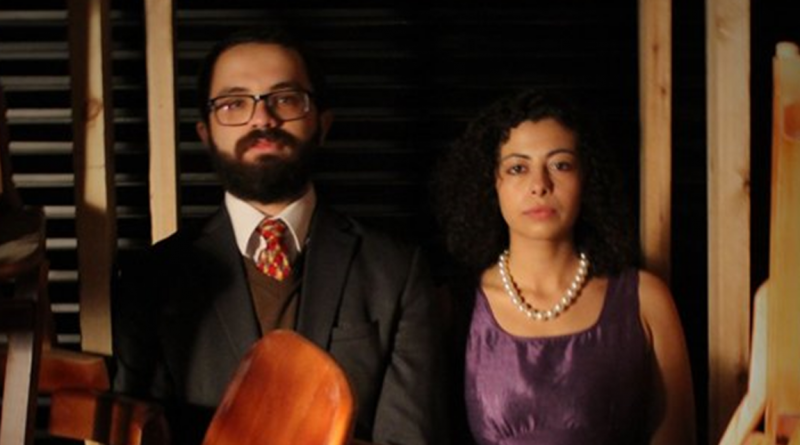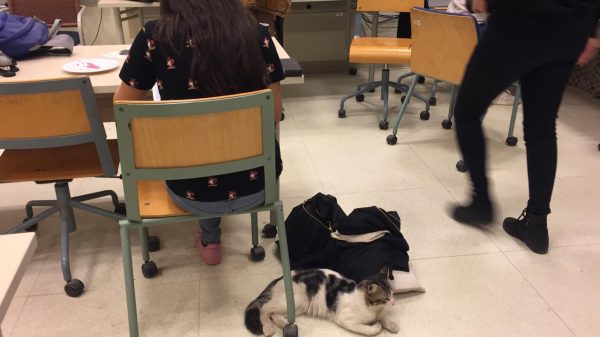A Story of Humanity: The Skin of Our Teeth
By: Malak Kamel
@MK__Malak
Photo: Promotional poster for The Skin of our Teeth
AUC’s Theatre Program took to the stage once again with an adaptation of American playwright, and Pulitzer prize winner Thornton Wilder’s The Skin of our Teeth.
Written in 1942, the play highlights the human experience through three different acts, all of which follow the Antrobus family, going through the various trials of life.
“After coming back from the pandemic, I was interested in exploring a story of humanity and the crises that we perpetually kind of bring on ourselves,” Adam Marple, Assistant Professor of Directing in the Department of Arts, who is also the play director, told The Caravan.
The play follows a lengthy time span, covering the Ice Ages, floods and wars, and in the process, it emphasizes how the family manage to survive by “the skin of their teeth.” On a larger scale, it is a statement of the human race’s impeccable ability to persevere no matter the circumstances.
Composed of George and Maggie Antrobus, their children Gladys and Henry, and their maid, Sabina, the family dynamic is a focal point of the play. Cherished bonds, and breaking points are all viewed amidst the hectic world they live through.
“The play gives this sense of hope without shying away from the horrible things that happen. It’s a way of saying ‘we’re horrible people, we do horrible things, but we get a little bit better every single day’,” Marple added.
Marple tried to incorporate this idea into the set design of the play by taking an environmental approach. Instead of spending money to purchase the items needed to put together a well-rounded set, Marple resorted to using recycled trash, ranging from plastic bottles to cardboard boxes.
“It’s not me saying ‘oh everybody needs to recycle’, but it is saying [that] we can do better, and that is ultimately the story of The Skin of Our Teeth,” Marple said.
Having joined AUC this semester, Marple brought along his distinctive perspective and expansive expertise, and while his knowledge in theatre is broad, it seems that his infamous phrase among the cast members during preparation for the play was “I don’t know.”
“Of course I know, but it doesn’t serve the purpose of the play for me to say ‘you do this’, because then I shut down their creativity. If I say ‘I don’t know’… well, you have two choices: you can come up with something or we can sit here in paralysis,” Marple said.
Marple views himself as a collaborative director who indicates the general direction he intends for the play, while leaving space for the cast members to input their own vision and ideas.
He explained that this was achieved through allowing the actors to feel heard by providing them with a safe environment where they can thrive.
“Everyone thinks that directors are conductors or puppet masters. But I think that is the exact opposite of it,” Marple said.
Marple’s philosophy left an impression on the cast members who noticeably prospered with buoyant attitudes and exuberant energy during the curtain call.
“He had us do a lot of different things and [experiment with] ways of warming up and connecting together as a cast that honestly I hadn’t been exposed to before in theatre here ever. It was amazing,” said Political Science alumna Arwa Hezzah, who played Maggie Antrobus.
Despite the new techniques and methods implemented, it seems that the cast came to admire their newly acquired theatre toolbox.
Hezzah added that she assumed that confusion among the audience might be prominent since the play is not as straightforward as some might prefer it to be.
The message of the play is not directly stated, nor is the time or place of the different scenes consistent. While this contributed to the success of the play when it was first performed, it left some of the audience members wondering.
For example, during act two of the play, George and Maggie Antrobus were found celebrating their 5000th anniversary, which although this might sound absurd and confusing, it was a way to indicate the lengthy time span presented in the play.
Furthermore, the Antrobus son, Henry, was referred to as Cain who killed his brother Abel in the biblical story and Noah’s Ark was included in the finale of act two. The inclusion of all those different stories as well as timelines were where the source of confusion mainly stemmed from.
“It needs the audience to dive into it and dissect it,” Hezzah said, reiterating the existence of an underlying message that awaits to be discovered.
The crew exerted vast efforts, having to rehearse nearly everyday for an average of four hours for two months.
Efforts did not just simply consist of memorizing and reciting lines, but rather expressing the desired emotions, ensuring all props were available and working cohesively together.
“At first there was the issue of time, where the play would have exceeded the time limit, but we were able to adjust it perfectly. It would have been more than two hours, but we made it exactly two hours which is something I’m very proud of,” Theatre senior, and Assistant Stage Manager, Zeina Sakkijha said.




